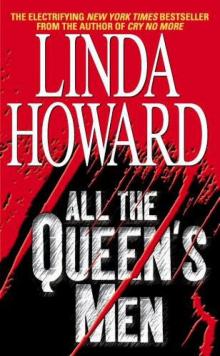- Home
- Linda Howard
Kiss Me While I Sleep cs-3 Page 4
Kiss Me While I Sleep cs-3 Read online
Page 4
The first thing she did once she was back in her flat was subject it to the same exhaustive search that the bathroom had received. To her relief, she didn’t find anything. Rodrigo must not suspect her, or he would have had the place bugged seven ways from Sunday while she’d been incapacitated. No, he would have killed her on just suspicion alone.
That didn’t mean she was safe. When he asked about her past lovers, she’d known she had only a few days to get away, because he would be digging deeper into Denise’s past and finding out there was no past.
If her flat had been searched—and she had to assume it had been—the searchers had been very neat. But they hadn’t found her stash of getaway items, or she wouldn’t be standing here now.
The old building had once been heated by fireplaces, which at some time after World War II had been replaced by radiators. The fireplace in her flat had been bricked over, and a chest shoved in front of it. She had put a cheap rug under the chest, not to prevent the floor from being scarred, but so she could silently move the chest about by pulling the rug. She pulled the rug away from the wall now, and got down on her belly to inspect the bricks. Her repair job wasn’t noticeable; she’d dirtied the mortar so it looked as aged as the mortar around it. There wasn’t any mortar dust on the floor, either, to indicate that anyone had tapped on the bricks.
She got a hammer and chisel, lay down on her belly again, and began gently tapping the mortar from around one of the bricks. When it was loosened, she worked it free, then another, then another. Reaching her hand into the cavity of the old fireplace, she pulled out an array of boxes and bags, each item safely wrapped in plastic to keep it clean.
One small box held her alternate identities: passports, credit cards, driver’s licenses, ID cards, depending on which nationality she chose. A bag held three wigs. There were distinctive changes of clothes, kept hidden because they were so memorable. Shoes were a different matter; she’d simply put the shoes she’d need in her closet, dumped in a pile with all her other shoes. How many men would pay any attention at all to a tangle of shoes? She also had a supply of cash, in euros, pounds sterling, and American dollars.
In the last box was a secure cell phone. She turned it on and checked the battery: low. Taking out the charger, she plugged it into a wall outlet and set the phone in the cradle.
She was exhausted, sweat beading her forehead. She wouldn’t go tomorrow, she thought; she was still too weak. But day after tomorrow, she would have to move, and move fast.
So far she’d been lucky. Rodrigo had kept the news of Salvatore’s death quiet for several days, which had bought her some time, but with every minute that passed, the danger grew that someone in Langley would see a photograph of Denise Morel, scan it into a computer, and the computer would spit out the report that, hair and eye color aside, Denise Morel’s features matched those of one Liliane Mansfield, contract agent for the U.S. Central Intelligence Agency. Then the CIA would be hot on her trail, and the Agency had resources Rodrigo Nervi could only dream about. For practical reasons, Salvatore had been left in place with the Agency’s blessings; no one there would look kindly on her for taking him out.
It was a toss-up who would come after her first, Rodrigo or someone sent by the CIA. She would have a better chance against Rodrigo, because he would probably underestimate her. The Agency wouldn’t make that mistake.
Because it would look odd if she didn’t, and also because she wanted to see if she was under surveillance, she bundled up against the chill and walked to the neighborhood market. She’d spotted one guard as soon as she came out of her building; he was sitting in a nondescript gray car parked halfway down the block, and as soon as she walked out, he lifted a newspaper to cover his face. Amateur. But if there was one in front, she could assume there was also one in back. The good news was there wasn’t a guard inside her building, which would have made matters a bit more iffy. She didn’t want to have to go out a third-story window, as weak as she was.
She carried a cloth shopping bag into which she put some produce and fruit. An Italian-looking man—who didn’t really stand out unless you were specifically looking for him—meandered around in her wake, always keeping her in view. Okay, that made three. Three were enough to do a competent job, but weren’t so many that she couldn’t handle them.
After paying for her selections, she walked back to her flat, careful to keep her gait rather slow and laborious. She walked with her head down, the picture of dejection, and not the way anyone who was the least alert would walk. Her watchers would think she was completely unaware of them and, moreover, that her health was still so precarious she could scarcely get around. Since they weren’t extraordinarily skilled in surveillance, that meant they would somewhat relax their guard without realizing it, because she was such a poor challenge.
When her cell phone was fully charged, she took it into the bathroom and turned on the tap water to mask sound, in case a parabolic microphone was aimed at her flat. The chance of that was admittedly small, but in her business paranoia saved lives. She booked a first-class one-way ticket to London, disconnected, then called back and, under another identity, booked a flight out of London that left within half an hour of her arrival, headed back to Paris, where absolutely no one would expect her to go. After that, she would see, but that little maneuver should buy her some more time.
Langley, Virginia
Early the next morning, a junior analyst named Susie Pollard blinked at what the computer facial-recognition program had just told her. She printed out the report, then wove her way through a maze of cubicles to stick her head inside another cubicle. “This looks interesting,” she said, handing the report to a senior analyst, Wilona Jackson.
Wilona slid her glasses into place and swiftly looked over the document. “You’re right,” she said. “Good catch, Susie. I’ll kick this upstairs.” She stood, a six-foot-tall black woman with austere features and a no-bullshit attitude honed to perfection on her husband and five rowdy sons. Without another woman in the household for backup, she said, she had to stay on top of things. That carried over to her work, where she tolerated no nonsense. Anything she kicked upstairs was given proper consideration, or else.
By noon, Franklin Vinay, director of operations, was reading the report. Salvatore Nervi, the head of the Nervi organization—he couldn’t call it a corporation, though corporations were involved—was dead of an undisclosed ailment. The exact date of his death was unknown, but Nervi’s sons had buried him at their home in Italy before releasing the news. His last sighting was at a Parisian restaurant, with a lapse of four days between then and the announcement of his death. He had apparently been in perfect health, so the unknown ailment had occurred rather abruptly. It happened, of course; heart attacks or strokes struck down seemingly healthy people every day.
What set the alarm bells to clanging was the facial-recognition program, which said that, without doubt, Nervi’s newest lady friend had been none other than one of the CIA’s best contract agents in disguise. Liliane Mansfield had darkened her wheat-blond hair and put in dark contacts to hide her distinctive pale blue eyes, but it was undoubtedly her.
Even more alarming was the fact that, a few months ago, two of her closest friends and their adopted daughter had died at Nervi’s hands. All of the indications were that Lily had gone off the reservation and taken matters into her own hands.
She’d known the CIA wouldn’t sanction the kill. Salvatore Nervi was a disgusting example of humanity who deserved killing, but he’d been smart enough to play both ends against the middle and make himself useful, as insurance against just this sort of thing. He had passed along extremely useful information, and done so for years. That information pipeline was now lost, perhaps irrevocably; it would take them years, if they could at all, to develop the same relationship with the heir apparent. Rodrigo Nervi was notoriously suspicious, and not apt to jump at any partnership. Frank’s only hope in that direction was that Rodrigo would prove to be as pragmatic as his
father.
Frank hated working with the Nervis. They had some legitimate business concerns, yes, but they were like Janus: everything they did had two faces, a good side and a bad side. If their researchers were working on a cancer vaccine, another group in the same building was working to develop a biological weapon. They gave huge amounts of money to charitable organizations that did a lot of good work, but they also funded terrorists groups that killed indiscriminately.
Playing in the pool of world politics was like playing in a sewer. You had to get dirty in order to play. Privately, Frank thought the end of Salvatore Nervi was good riddance. In the realm of his work, though, if Liliane Mansfield was responsible, he had to do something about it.
He pulled up her security-coded file and read it. Her psychological profile said that she’d been operating under some strain for a couple of years now. In his experience there were two types of contract agents: those who did their work with no more emotion than they would expend on swatting a fly, and those who were convinced of the good they did but whose souls, nevertheless, wore thin under the constant assault. Lily was in the latter group. She was very good, one of the best, but each hit had left its mark on her.
She had stopped contacting her family years ago, and that wasn’t good. She would feel isolated, cut off from the very world she’d worked to protect. Under those circumstances, her friends in the business had become more than just friends; they’d become her surrogate family. When they were hit, her tattered soul had perhaps taken one blow too many.
Frank knew some of his colleagues would laugh at him, thinking in terms of souls, but he’d been in this business a long time and he not only knew what he saw, he understood it.
Poor Lily. Perhaps he should have pulled her out of the field when she first started showing signs of psychological strain, but it was too late now. He had to deal with the situation that existed.
He picked up the phone and had his assistant locate Lucas Swain, who, wonder of wonders, was actually in the building. The fickle Fates must have decided to smile on Frank.
Some forty-five minutes later, his assistant buzzed him. “Mr. Swain is here.”
“Send him in.”
The door opened and Swain sauntered in. Actually, he sauntered everywhere. He walked like a cowboy who had nowhere to go and wasn’t in any hurry to get there. Ladies seemed to like that about him.
Swain was one of those good-looking people who seemed to be perpetually good-natured, too. There was a goofy smile on his face as he said hello and took the chair Frank indicated. For some reason, the smile worked in the same way as the walk: people liked him. He was a devastatingly effective field officer because he went in under people’s radar. He might be a happy man, he might have a walk that looked like the definition of laziness, but he got the job done. He’d been getting the job done in South America for the better part of a decade, which explained the deep tan and rock-hard leanness.
He was beginning to show his age, Frank thought, but then, weren’t they all? There was gray at the temples and along the hairline of Swain’s brown hair, which was kept cropped short because of an unruly cowlick in front. There were lines bracketing his eyes and on his forehead, creases in his cheeks, but with his luck, the ladies probably thought that was as cute as his walk. Cute. It was a sad day in hell, Frank reflected, when he was mentally describing one of his best male field officers as cute.
“What’s up?” Swain asked, stretching his long legs out as he relaxed, his spine curving so he sank down in his chair. Formality wasn’t Swain’s way.
“A delicate situation in Europe. One of our contract agents has gone off the reservation, killed a valuable asset. We need her stopped.”
“Her?”
Frank handed the report over the desk. Swain took it and swiftly read through it, then passed it back. “The deed’s done. What’s there to stop?”
“Salvatore Nervi wasn’t alone in the situation that ended with the death of Lily’s friends. If she’s on a rampage to get all of them, she could wreck our entire network. She’s already done considerable damage by eliminating Nervi.”
Swain screwed up his face and briskly rubbed both hands over it. “Don’t you have some irrascible rogue agent, forcibly retired under a cloud, with some special skill that makes him the only choice possible for locating Ms. Mansfield and stopping her killing ways?”
Frank bit the inside of his cheek to control a smile. “Does this look like a movie production to you?”
“A man can hope.”
“Consider your hopes dashed.”
“Okay, then, how about John Medina?” Swain’s blue eyes were full of laughter as he got into the spirit of deviling Frank.
“John’s busy in the Middle East,” Frank said calmly.
His reply brought Swain upright in his seat, all hint of laziness gone. “Wait a minute. Are you saying there really is a Medina?”
“There really is a Medina.”
“There’s no file on him—” Swain began, then caught himself, grinned, and said, “Oops.”
“Meaning you’ve checked.”
“Hell, everyone in the business has checked.”
“That’s why there’s no file in the computer system. For his protection. Now, as I was saying, John’s deep cover in the Middle East, and in any case, I wouldn’t use him for a retrieval.”
“Meaning he’s way more important than I am.” Swain had that goofy grin again, meaning he took no offense.
“Or that he has different talents. You’re the man I want, and you’ll be on a plane to Paris tonight. Here’s what I want you to do.”
4
After spending an entire day eating, resting, and doing light workouts to increase her stamina, Lily got up the morning of her departure feeling much better. She carefully packed her carry-on bag and shopping tote, making sure she was leaving nothing crucial behind. Most of her clothes were left hanging in the closet; the odd photographs of complete strangers that she had put in cheap frames and set around the flat, to give herself the appearance of a background, were left in place.
She didn’t strip the bed linens or wash the single bowl and spoon she’d used for breakfast, though she did take the precaution of thoroughly wiping the place down with oil-dissolving disinfectant, to destroy her fingerprints. That was something she’d been doing for nineteen years, and the habit was strongly ingrained. She had even wiped down her surroundings before leaving the Nervi compound, though she hadn’t been able to use a disinfectant. She had also always wiped her eating utensils and drinking glasses with a napkin before they were collected, and cleaned her hairbrush every morning, flushing the stray hairs that collected in the bristles.
She was uncomfortably aware she couldn’t do anything about the blood Dr. Giordano had drawn for analyzing, but DNA wasn’t used for identification the same way that fingerprints were; there was no extensive database. Her fingerprints were on file in Langley, but nowhere else; except for the occasional assassination, she’d been a model citizen. Even fingerprints were no good unless there was a file somewhere to match them to, and get a name. One slipup meant nothing. Two provided a means of identification. To the best of her ability, she tried never to provide even a starting point.
Probably Dr. Giordano would find it odd in the extreme if she called him and asked for the return of any leftover blood. If she were in California, now, she could claim she was a member of a weird religious cult and needed the blood, or even that she was a vampire, and probably get any remnants returned.
The ghoulish thought made her mouth curve into a wan smile, and she wished she could share that thought with Zia, who’d had a rich sense of the absurd. With Averill and Tina, and especially with Zia, she’d been able to relax and act silly occasionally, like a normal person. For someone in her line of work, relaxation was a luxury, and done only with others of her kind.
The faint smile faded. Their absence left such a huge void in her life that she didn’t think she’d ever be able to fill
it. Over the years her affection had been given to an ever-shrinking circle, until finally there had been just five people in it: her mother and sister—and she no longer dared visit them for fear of bringing the danger of her job to their doorsteps—and three friends.
Averill had once been her lover; for a very brief time they had staved off the loneliness together. Then they had drifted apart, and she met Tina during a job that required two agents. She had never bonded instantly with anyone before the way she had with Tina, as if they had been twins meeting for the first time. They had only to look at each other to know they were thinking the same things at the same times. They had the same sense of humor, the same silly dreams that someday, when they weren’t in this line of work any longer, they’d get married and own their own businesses—not necessarily in that order—and maybe even have a kid or two.
Someday had come for Tina when, like helium balloons floating around in a closed room, Averill eventually floated across her path. Lily and Tina might have had tons in common, but chemistry was one thing that was different; Averill took one look at slim, brunette Tina and fell in love, and the feeling was mutual. For a while, between jobs, they had bummed around together and generally had a blast. They were young and healthy and good at their jobs; admittedly, being assassins made them feel tough and invincible. They were professional enough not to swagger, but young enough to feel the rush.
Then Tina was shot, and reality crashed down on them. The job was deadly. The rush was no longer there. Their own mortality stared them in the face.
Averill and Tina reacted to it by getting married, as soon as Tina was well enough to walk down the aisle. They set up housekeeping together, first in a flat here in Paris, then they bought a small house on the outskirts. They began taking fewer and fewer jobs.

 Mr. Perfect
Mr. Perfect All the Queen's Men
All the Queen's Men Midnight Rainbow
Midnight Rainbow Diamond Bay
Diamond Bay Dying to Please
Dying to Please The Woman Left Behind
The Woman Left Behind Come Lie With Me
Come Lie With Me Drop Dead Gorgeous
Drop Dead Gorgeous To Die For
To Die For Ice
Ice Overload
Overload Shadow Woman
Shadow Woman Veil of Night
Veil of Night White Lies
White Lies Son of the Morning
Son of the Morning The Complete Mackenzies Collection
The Complete Mackenzies Collection Lake of Dreams
Lake of Dreams DeathAngel
DeathAngel Loving Evangeline
Loving Evangeline Burn
Burn Mackenzie's Magic
Mackenzie's Magic Against the Rules
Against the Rules Burn: A Novel
Burn: A Novel A Lady of the West
A Lady of the West Almost Forever
Almost Forever Open Season
Open Season Now You See Her
Now You See Her Prey
Prey Cry No More
Cry No More Sarah's Child
Sarah's Child Angel Creek
Angel Creek Death Angel
Death Angel Kill and Tell
Kill and Tell The Touch of Fire
The Touch of Fire Raintree: Inferno
Raintree: Inferno Killing Time
Killing Time Cover of Night
Cover of Night Tears of the Renegade
Tears of the Renegade Heartbreaker
Heartbreaker The Cutting Edge
The Cutting Edge All The Queen's Men cs-2
All The Queen's Men cs-2 Veil of Night: A Novel
Veil of Night: A Novel Blood Born
Blood Born The Complete Mackenzie Collection
The Complete Mackenzie Collection Mackenzie's Magic m-4
Mackenzie's Magic m-4 Mackenzie's Pleasure m-3
Mackenzie's Pleasure m-3 Raintree
Raintree A Game Of Chance m-5
A Game Of Chance m-5 Prey: A Novel
Prey: A Novel Lethal Attraction: Against the RulesFatal Affair
Lethal Attraction: Against the RulesFatal Affair The Raintree Box Set: Raintree: InfernoRaintree: HauntedRaintree: Sanctuary
The Raintree Box Set: Raintree: InfernoRaintree: HauntedRaintree: Sanctuary The Woman Left Behind: A Novel
The Woman Left Behind: A Novel Dream Man
Dream Man Frost Line
Frost Line Kill and Tell cs-1
Kill and Tell cs-1 Shadow Woman: A Novel
Shadow Woman: A Novel Mackenzie's Mission
Mackenzie's Mission Strangers in the Night
Strangers in the Night Running Blind
Running Blind